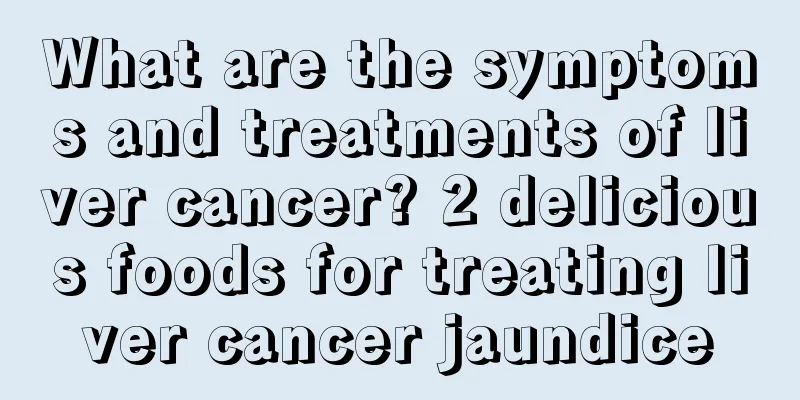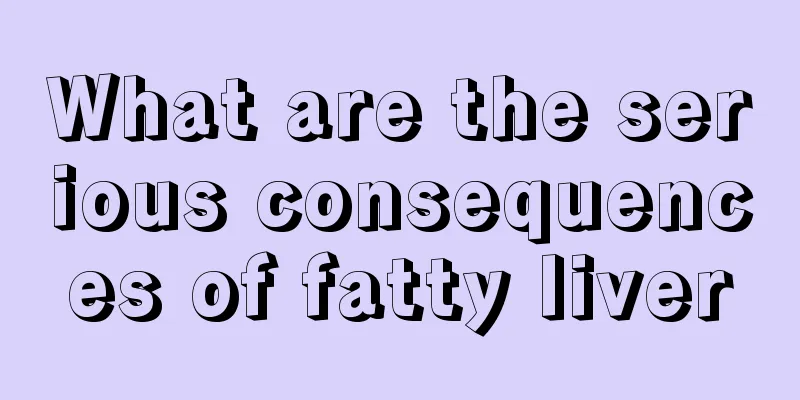What are the symptoms and treatments of liver cancer? 2 delicious foods for treating liver cancer jaundice

|
What are the symptoms and treatments of liver cancer? Liver cancer is a disease that people always discover only when it is seriously developed, resulting in a rising mortality rate. Experts say that in the treatment of liver cancer, we should not only grasp the timing well, but also choose the right treatment method. So, what are the symptoms and treatments of liver cancer? Symptoms of Liver Cancer 1. Early symptoms: 1. Significant decrease in appetite, indigestion, sometimes nausea, abdominal distension, and vomiting; 2. Continuous or intermittent pain in the liver area, dull pain in the right upper abdomen, sometimes aggravated by changes in body position; 3. Subcutaneous bleeding, nosebleed, etc.; 4. Ascites, itchy skin, and jaundice; 5. Fever and edema of unknown cause, fatigue, and weight loss. 2. Symptoms in the middle and late stages: mainly jaundice, weight loss, ascites, liver pain, fatigue, etc. The details are as follows: 1. Gastrointestinal symptoms, indigestion, nausea, vomiting, diarrhea, etc. 2. Weight loss and fatigue. 3. Fever, generally low fever, occasionally reaching 39 degrees or above. 4. Pain in the liver area, the most common is intermittent continuous dull pain or distending pain, caused by the rapid growth of the cancer, which tightens the liver capsule and causes tumor invasion of the diaphragm pain, which can radiate to the right shoulder or right back; tumors growing to the right back can cause right waist pain. 5. Symptoms of metastatic lesions, there are corresponding symptoms where the tumor metastasizes, such as coughing and hemoptysis when metastasized to the lungs; pleural metastasis can cause chest pain and bloody pleural effusion; metastasis to the bones can cause local pain or pathological fractures; metastasis to the spine or compression of the spinal nerves can cause local pain or paraplegia; intracranial metastasis can cause corresponding symptoms, such as intracranial hypertension can lead to brain herniation and sudden death. 6. Jaundice, jaundice is a common sign of middle and late liver cancer, and diffuse liver cancer and cholangiocarcinoma are most likely to have jaundice. 7 Other systemic symptoms, common ones include spontaneous hypoglycemia, polycythemia, hyperlipidemia, hypercalcemia, etc. Treatment for liver cancer 1. Liver transplant surgery Liver transplantation is the only radical surgical method for treating mid- to late-stage liver cancer. It involves implanting a healthy liver into the patient's body to restore liver function to normal levels. In short, after removing the patient's diseased liver, the donor liver is implanted into the recipient's (patient's) original liver location according to the normal anatomical structure of the human body. 2. Liver resection surgery Liver resection surgery is a radical treatment for liver cancer patients by Navy hepatobiliary experts. It is still the preferred method for curing early and middle-stage liver cancer in the medical field, both in the past and now. Liver resection surgery is based on the patient's best prognosis. During the operation, necrotic and cancerous tumors in the liver are accurately removed, while minimizing the patient's trauma. The Navy's hepatobiliary surgery department's authoritative liver resection technology has incomparable advantages, including less trauma to patients, complete tumor resection, fast recovery, and fewer postoperative complications. 3. Radiofrequency ablation technology Radiofrequency ablation is an advanced technology that integrates human and machine operation. It accurately locates the local cancerous cells and causes coagulative necrosis to block the spread of liver cancer cells. It is an interventional technology that causes little damage to other liver tissues and adjacent tissues. Therefore, it is more suitable for patients with small liver cancer and multiple liver cancers. The intraoperative trauma is small and the recovery is fast. After the operation, the patient strictly follows the doctor's instructions and observes for a period of time before being discharged from the hospital. This method reduces the pain of liver cancer patients and allows them to return to normal life in a short time. 4. Cellular Immunotherapy Liver cancer can be treated with cellular immunotherapy, which can stimulate the body's own immune system to inhibit and treat tumors. It can make up for the shortcomings of traditional surgery, radiotherapy and chemotherapy. While killing tumor cells, it regulates and restores the body's immune function, kills formed tumor cells, inhibits the formation of new tumor cells, and blocks the source of tumor recurrence and metastasis. It is the best way to treat liver cancer. There are many ways to treat liver cancer, and this disease cannot be treated without medicine. However, we would like to remind you that we must follow the doctor's instructions when choosing medicine for liver cancer, and we must not take medicine blindly to avoid more serious consequences. Finally, I wish you a speedy recovery. 2 delicious dishes to treat liver cancer jaundice Mid- to late-stage liver cancer is a more serious condition. Due to the spread and compression of the cancer, the patient may experience jaundice, which aggravates the condition and the patient's pain. Family members may wish to learn how to make food therapy that can be used to treat jaundice to help patients reduce discomfort and alleviate symptoms. Rock candy cheese Ingredients: 100g rock sugar, 10g cabbage, 400ml fresh milk, 180ml cold water. Preparation: Chop the cabbage and soak it in water for 30 minutes. Put an appropriate amount of water in a pot, add the cabbage, and cook it over low heat until it is soft. Then add rock sugar and cook until the cold sugar is completely dissolved. Pour fresh milk into the cooked rock sugar cabbage soup and cook for a while before turning off the heat. Pour the cheese into a bowl while it is still hot, fill each bowl to 80%, put it in the refrigerator after it cools down, and eat it after it is completely frozen. It is sweet and delicious. Usage: Eat at any time. Efficacy: Removes jaundice and detoxifies, nourishes the heart and kidneys, and is used for patients with jaundice caused by liver cancer and toxic heat. Pickled Cauliflower Ingredients: 1 cauliflower, 2 medium cucumbers, 1 small bamboo shoot, 1 red pepper, 2 bay leaves, 2 cups of vinegar, 3 tablespoons of sugar, 1 teaspoon of salt, a little pepper, cloves, and cinnamon. Preparation: Boil vinegar, water, sugar, salt and deseeded red pepper in a pot and wait until it cools down. Put it in a wide-mouthed bottle and add laurel leaves, pepper, cloves and cinnamon. Remove the hard stem end of the cauliflower, cut it into small pieces, blanch it in boiling water and remove it. Wash the cucumber and cut it into 5cm long sections. Cut the bamboo shoots and cut them into 5cm long strips as thick as chopsticks. Then put all these ingredients in a wide-mouthed bottle and marinate for 2 hours before eating. Usage: Can be taken with meals. Efficacy: Regulates internal organs, eliminates blood stasis and detoxifies. Used for patients with jaundice in the early stages of liver cancer. |
Recommend
What's wrong with thirst, fatigue and sleepiness
Thirst may be caused by eating too much salt or n...
What to do if you have goose bumps due to fever
Many people will feel that although their body te...
Are bad teeth caused by kidney problems?
Many people have bad dental problems. Dental prob...
Detailed explanation of what causes mumps
Mumps is located below or on both sides of our ea...
Is molecular targeted therapy effective for liver cancer? Introducing traditional Chinese medicine treatments for liver cancer
Traditional Chinese Medicine Treatment Methods fo...
What causes women to suffer from teratoma
What causes women to suffer from teratoma? Terato...
Surface location of sciatic nerve
It is generally believed that a medical image exa...
How to prevent mosquito bites
In hot summer, there are more mosquitoes. At this...
Leather clothing maintenance methods
People wear leather clothes the most in winter, w...
What kind of meat can I eat if I have too much stomach acid? It turns out to be this kind
As we all know, excessive stomach acid needs to b...
Why do I feel dizzy when I sleep at night?
Dizziness is a problem we often encounter in dail...
Why do I always feel nauseous and retching when brushing my teeth?
Everyone should brush their teeth twice a day to ...
Grape seeds treat rhinitis
Grape seeds are a health product sought after by ...
How to check thyroid cancer
Once we feel that we have a disease, we must reme...
Can raw eggs and beer enhance sexual performance?
There is a folk remedy that raw eggs and beer can...









